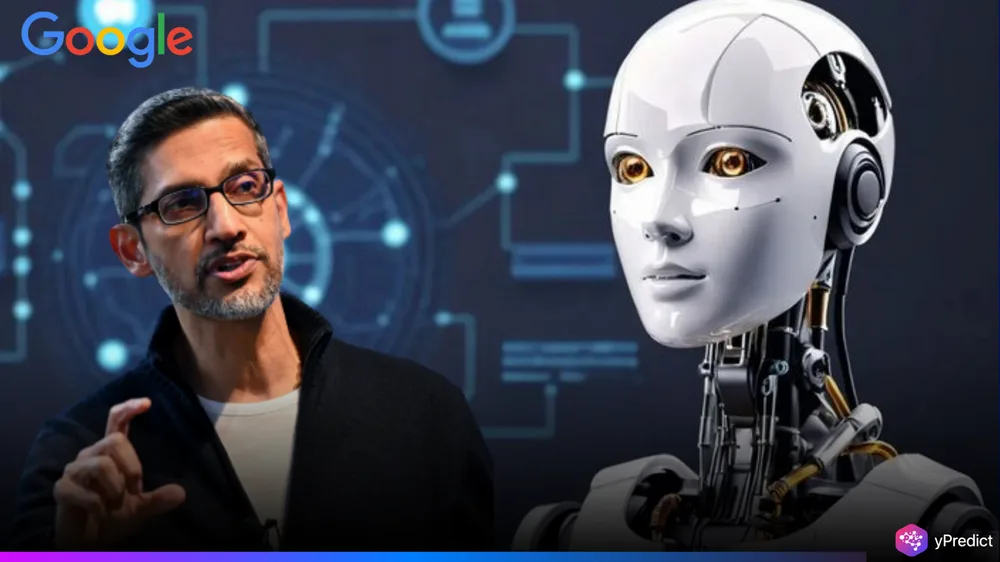
As artificial intelligence continues to transform industries, one question keeps resurfacing: Will AI eventually replace human workers? In the tech world, this concern is especially pressing for software engineers. However, according to Google CEO Sundar Pichai, there’s no need to panic, at least not yet. In a recent interview with AI researcher and podcast host Lex Fridman, Pichai made it clear that AI’s role is to assist coders, not eliminate them.
AI as a Coding Assistant, Not a Replacement
Pichai revealed that AI has become deeply embedded in Google’s software development processes. Currently, around 30% of the code written within Google includes AI-generated components. However, he emphasized that the real value of AI lies not in how much code it writes, but in how it boosts overall engineering efficiency. According to him, the company has seen a 10% increase in engineering velocity, an impressive improvement at Google’s massive scale.
Rather than using this productivity gain to cut jobs, Google is doing the opposite. The company plans to hire more engineers in the coming year. Pichai believes that the possibilities of what can be built are growing, and more creative minds will be needed to explore them.
Making the Developer’s Job More Creative
One of the biggest advantages of AI in coding, according to Pichai, is how it makes programming more enjoyable. He described how much of a software engineer’s time is spent on repetitive tasks, debugging, writing test cases, and generating boilerplate code. These are necessary parts of the job, but they are often considered tedious. By automating these tasks, AI allows developers to spend more time doing what they love: designing systems, solving complex problems, and collaborating with teams.
This shift also makes software development more accessible to newcomers. With AI handling some of the more technical grunt work, aspiring developers who lack formal training can still make meaningful contributions. Pichai said that this democratization of creative tools will encourage more people to code, ultimately leading to more innovation and more engineers building exciting new things.
Human Creativity Remains Irreplaceable
Even though some AI tools have been developed, Google Gemini, GitHub Copilot, ChatGPT, etc., Pichai said that these tools still need a human’s hand to steer them. AI can write code, but it doesn’t know long-term design goals or the subtleties of the project. AI is not capable of replicating the high-level critical thinking and problem-solving that comes from experienced engineers.
Pichai’s remarks align with a growing perspective in the tech world: AI is a great collaborator, but it should not replace human effort. AI is a valuable tool, but it isn’t a creative force. AI can help you build things faster, but it does not and cannot tell you what to build, or more importantly, why.
A Viral Moment Highlights Google’s Responsiveness
Pichai’s comments came at a time when Google was under light scrutiny for user experience issues. Quora CEO Adam D’Angelo had publicly criticized the audio quality of Google Meet, and Pichai responded promptly, promising improvements. Meanwhile, Elon Musk used the moment to promote his social platform X, showcasing the lively competition among tech giants. Still, Pichai’s professional and proactive stance underlined Google’s commitment to continuously improving its services while expanding its workforce.
The Future of Coding Jobs
Sundar Pichai’s remarks give us a hopeful vision of AI and employment going forward in the future. As Pichai stated, “Whether people are looking for direct support, whether people are looking for helping them to be more productive, they are still the main person.” AI will augment productivity for human coders based eliminating repetitive tasks. AI will allow humans the opportunity to think creatively. AI will potentially improve many roles in the workplace, but it will not replace human programmers at any time in the future.
As we gain maturity as an industry in reference to AI, the first bucket means that while the world will not become leveled through automating outputs, there will be opportunities to produce more. We will need more tools, more inventions, and more human talent to support the opportunities of AI. In that sense, the age of AI is not the graveyard for developers; it may simply be a new beginning and evolution of software development defined by human creativity.






